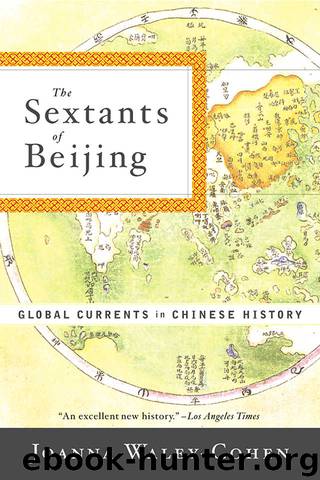The Sextants of Beijing: Global Currents in Chinese History by Joanna Waley-Cohen

Author:Joanna Waley-Cohen [Waley-Cohen, Joanna]
Language: eng
Format: epub
Publisher: W. W. Norton & Company
Published: 0101-01-01T00:00:00+00:00
THE RUSSIANS, THE BRITISH, AND
THE FRENCH, 1856–1860
With the end of the Crimean War in 1856, Russia, Britain, and France all turned their attention back to China. Russia had been following events in China closely and was aware that now might be the moment to strike. During the eighteenth century the Russian empire had expanded eastward into Siberia and was now more eager than ever to expand trade with China and to investigate the possibility of extending its political and commercial influence in the northeastern parts of Manchuria that bordered its own territory. Qing policies excluding Han Chinese settlement in the area—out of a vague intent to keep Manchuria for the Manchus—had left the area sparsely populated. Russia was also anxious to take advantage of any opportunity that would strengthen its position in relation to Britain. While the Qing were distracted from frontier affairs by the Taiping and other uprisings, with many of their Manchurian military forces diverted to the interior, Russian exploratory expeditions pushed southward, and Russian settlement in northeastern Manchuria began to spread. China was in no position to resist Russian demands. A combination of aggression and skillful diplomacy enabled Russia to achieve its aim of effectively taking over control of the region from China, by the Sino-Russian Treaty of Beijing (1860). This vastly expanded trade, allowed a Russian consular presence in strategic spots in Mongolia and Xinjiang, immunity from Chinese law for Russian nationals, and much broader channels of communication than previously.
At the same time the slow pace of progress in the treaty ports other than Shanghai, together with disillusion with the Taiping, stoked the impatience of the British and other foreigners whose area of concentration was the China coast. Their main goals were the expansion of trade, the installation of ambassadors in Beijing so as to bypass Canton altogether, and the reduction of customs duties. The Westerners were particularly annoyed by the continuing refusal or inability of Qing authorities to bring Canton to heel with regard to the issue of admitting them. China was bound to apply to Britain the provisions for treaty revision inserted into an 1844 treaty with the United States, which Britain, somewhat disingenuously, interpreted as meaning that the 1842 Treaty of Nanjing was due for revision in 1854. But in 1854 Qing officials had evaded renegotiation, not least because their main attention was focused on the state of civil war prevailing in much of the country.
In 1856 the British and French found pretexts to go to war with China again. The British claimed an insult to their flag after Chinese police, alleging piracy, had lowered a British flag on a vessel, owned by a Chinese resident in Hong Kong, that had a British captain and Chinese crew. The French claimed the judicial execution of a missionary in the interior as the ground for opening hostilities. After an initial stalemate marked by a display of Chinese truculence and Western firepower—now better equipped to bombard Canton than fifteen years earlier—followed by a delay while the British dealt with the Indian Mutiny, the Second Opium War began in earnest in late 1857.
Download
This site does not store any files on its server. We only index and link to content provided by other sites. Please contact the content providers to delete copyright contents if any and email us, we'll remove relevant links or contents immediately.
| Africa | Americas |
| Arctic & Antarctica | Asia |
| Australia & Oceania | Europe |
| Middle East | Russia |
| United States | World |
| Ancient Civilizations | Military |
| Historical Study & Educational Resources |
The Alienist by Caleb Carr(1804)
The Analects of Confucius by Burton Watson(1429)
On China by Henry Kissinger(1367)
China in Ten Words by Yu Hua(1213)
The Last Kings of Shanghai by Jonathan Kaufman(1213)
One Bright Moon by Andrew Kwong(1199)
The Snakehead: An Epic Tale of the Chinatown Underworld and the American Dream by Patrick Radden Keefe(1092)
Deng Xiaoping and the Transformation of China by Vogel Ezra F(1025)
Mao's Last Dancer by Li Cunxin(1025)
Three Tigers, One Mountain by Michael Booth(1012)
Seven Years in Tibet by Heinrich Harrer(1001)
Midnight in Peking by Paul French(967)
Big Sister, Little Sister, Red Sister by Jung Chang(953)
Tiger Trap by David Wise(919)
Ancient Chinese Warfare by Ralph D. Sawyer(857)
China Men by Maxine Hong Kingston(851)
Modern China. A Very Short Introduction by Rana Mitter(838)
The Open Road by Pico Iyer(806)
Riding the Iron Rooster by Paul Theroux(801)
